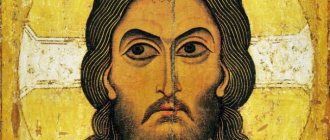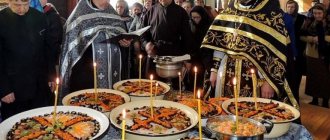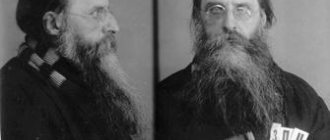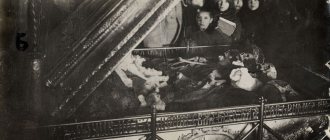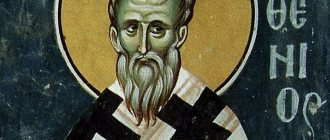Literature[ | ]
- Vvedensky A. M.
Life of the Varangian martyrs: chronicle and prologue // Ancient Russia. Questions of medieval studies. - 2008. - No. 3 (33). - Vvedensky A. M.
Life of the Varangian martyrs (the functioning of the legend in the chronicle and in the prologue) // Ancient Russia. Questions of medieval studies. - 2009. - No. 4 (38). — P. 63-72. - Kloss B. M.
Life of Fyodor the Varangian and his son // Written monuments of the history of Ancient Russia. Chronicles. Stories. Walking. Teachings. Lives. Messages. Annotated directory catalogue. - St. Petersburg, 2003. - Kolesov V.V.
The Legend of the Varangian and his son John // Russian speech. - 1981. - No. 5. - Lukin P.V.
The legend of the Varangian martyrs in the initial chronicles and the Prologue: textual aspect // Ancient Russia. Questions of medieval studies. - 2009. - No. 4 (38). — P. 73—96. - Markov A.V.
What were the names of the first holy martyrs in Russia // Collection of the Kharkov Historical and Philological Society. - T. XVIII. - Kharkov, 1909. - P. 437. - Pichkhadze A. A., Romodanovskaya V. A., Romodanovskaya E. K.
Lives of Princess Olga, Varangian martyrs and Prince Vladimir as part of the Sinai palimpsest (RNB, Q.p. I.63) // Russian hagiography. Research. Publications. Controversy. - St. Petersburg, 2005. - P. 302-303. - Rozhnetsky S.
What was the name of the first Russian holy martyr? // IORYAS. 1914 - Pg., 1915. - T. XIX. Book 4. - pp. 95-97. - Turilov A. A.
“Man of God in the Name” (On the name of the elder Varangian martyr) // Eastern Europe in antiquity and the Middle Ages: paganism, Christianity, church. Readings in memory of Corresponding Member of the USSR Academy of Sciences V. T. Pashuto. Moscow, February 20-22, 1995 Abstracts of reports. - M., 1995. - Shakhmatov A. A.
What was the name of the first Russian holy martyr? // Izvestia AN. - 1907. - T. 1. - No. 9. - Shakhmatov A. A.
Research on the most ancient Russian chronicles // Research on Russian chronicles. - M., 2001. - P. 26-27, 335-336.
- Poutsko BG
Les martyrs varègues de Kiev (983) // Analecta bollandiana. - 1983. - T. 101. Fasc. 3/4. - P. 374-375.
Memory[ | ]
Tithe Church in the 19th century
On the site of the martyrdom of father and son, Saint Vladimir subsequently erected the Tithe Church of the Assumption of the Blessed Virgin Mary - the first stone church in Kiev, consecrated on May 12, 996.
On June 5, 1983, thanks to the Committee of Russian Orthodox Youth, a celebration took place with the participation of 600 people, headed by the hierarch of the foreign church, Metropolitan Philaret (Voznesensky), bishops, clergy and monks. The grand hall of the Waldorf-Astoria Hotel was chosen as the venue for the celebration. In view of the upcoming 1000th anniversary of the Baptism of Rus', it was decided to celebrate the 1000th anniversary of the first Russian martyrs Saint Theodore and his son John[6].
Notes[ | ]
- ↑ 1 2 Romanov B.S.
Fatal predictions of Russia. - M.: JSC "OLMA Media Group", 2006. - P. 132. - 320 p. - ↑ 12345
Holy martyrs Theodore Varangian and his son John (Russian). Pravoslavie.ru. Access date: September 7, 2011. - ↑ 12
Holy Equal-to-the-Apostles Prince Vladimir (Russian) (inaccessible link). World. Human. Word. Access date: September 7, 2011. Archived July 1, 2013. - Zdravomyslov K. Ya.
Theodore (martyr, Varangian) // Russian biographical dictionary: in 25 volumes. - SPb.-M., 1896-1918. - Znamensky P.V.
History of the Russian Church. - Sergiev Posad, 2006. - P. 9-10. — 87 p. - Veneration of St. Seraphim of Sarov in Russian Diaspora
Excerpt characterizing Theodore Varangian and his son John
In the last days of August, the Rostovs received a second letter from Nikolai. He wrote from the Voronezh province, where he was sent for horses. This letter did not reassure the countess. Knowing that one son was out of danger, she began to worry even more about Petya. Despite the fact that already on the 20th of August almost all of the Rostovs’ acquaintances left Moscow, despite the fact that everyone tried to persuade the countess to leave as soon as possible, she did not want to hear anything about leaving until her treasure, her beloved, returned. Peter. On August 28, Petya arrived. The sixteen-year-old officer did not like the painfully passionate tenderness with which his mother greeted him. Despite the fact that his mother hid from him her intention not to let him out from under her wing, Petya understood her intentions and, instinctively fearing that he would become soft with his mother, that he would not be fooled (as he thought to himself), he treated him coldly with her, avoided her and during his stay in Moscow exclusively stuck to the company of Natasha, for whom he always had a special, almost loving brotherly tenderness. Due to the count's usual carelessness, on August 28 nothing was ready for departure, and the carts expected from the Ryazan and Moscow villages to lift all the property from the house arrived only on the 30th. From August 28 to 31, all of Moscow was in trouble and movement. Every day, thousands of wounded in the Battle of Borodino were brought to the Dorogomilovskaya outpost and transported around Moscow, and thousands of carts, with residents and property, went to other outposts. Despite Rastopchin's posters, or independently of them, or as a result of them, the most contradictory and strange news was transmitted throughout the city. Who said that no one was ordered to leave; who, on the contrary, said that they had lifted all the icons from the churches and that everyone was being expelled by force; who said that there was another battle after Borodino, in which the French were defeated; who said, on the contrary, that the entire Russian army was destroyed; who spoke about the Moscow militia, which would go with the clergy ahead to the Three Mountains; who quietly told that Augustine was not allowed to travel, that traitors had been caught, that the peasants were rioting and robbing those who were leaving, etc., etc. But that was only what they said, and in essence, those who were traveling and those who remained (despite the fact that there had not yet been a council in Fili, at which it was decided to leave Moscow) - everyone felt, although they did not show it, that Moscow would certainly be surrendered and that they had to get out themselves as soon as possible and save your property. It was felt that everything should suddenly break apart and change, but until the 1st, nothing had changed yet. Just as a criminal who is being led to execution knows that he is about to die, but still looks around him and straightens his poorly worn hat, so Moscow involuntarily continued its ordinary life, although it knew that the time of destruction was near, when everything would be torn apart. those conditional relations of life to which we are accustomed to submit. During these three days preceding the capture of Moscow, the entire Rostov family was in various everyday troubles. The head of the family, Count Ilya Andreich, constantly traveled around the city, collecting rumors circulating from all sides, and at home he made general superficial and hasty orders about preparations for departure. The Countess watched over the cleaning of things, was dissatisfied with everything and followed Petya, who was constantly running away from her, jealous of him for Natasha, with whom he spent all his time. Sonya alone managed the practical side of the matter: packing things. But Sonya has been especially sad and silent all this time. Nicolas's letter, in which he mentioned Princess Marya, evoked in her presence the countess's joyful reasoning about how she saw God's providence in Princess Marya's meeting with Nicolas. “I was never happy then,” said the countess, “when Bolkonsky was Natasha’s fiancé, but I always wanted, and I have a presentiment, that Nikolinka would marry the princess.” And how good that would be! Sonya felt that this was true, that the only way to improve the Rostovs’ affairs was to marry a rich woman and that the princess was a good match. But she was very sad about it. Despite her grief, or perhaps precisely as a result of her grief, she took upon herself all the difficult worries of orders for cleaning and arranging things and was busy all day long. The Count and Countess turned to her when they needed to order something. Petya and Natasha, on the contrary, not only did not help their parents, but for the most part they bothered and disturbed everyone in the house. And all day long you could almost hear their running, screaming and causeless laughter in the house. They laughed and rejoiced not at all because there was a reason for their laughter; but their souls were joyful and cheerful, and therefore everything that happened was a reason for joy and laughter for them. Petya was happy because, having left home as a boy, he returned (as everyone told him) a fine man; It was fun because he was at home, because he had left Belaya Tserkov, where there was no hope of getting into battle soon, and ended up in Moscow, where one of these days they would fight; and most importantly, it was cheerful because Natasha, whose mood he always obeyed, was cheerful. Natasha was cheerful because she had been sad for too long, and now nothing reminded her of the reason for her sadness, and she was healthy. She was also cheerful because there was a person who admired her (the admiration of others was the ointment of the wheels that was necessary for her car to move completely freely), and Petya admired her. The main thing is that they were cheerful because the war was near Moscow, that they would fight at the outpost, that they were distributing weapons, that everyone was running, leaving somewhere, that in general something extraordinary was happening, which is always joyful for a person, especially for a young person. On August 31, Saturday, in the Rostov house everything seemed to be turned upside down. All the doors were opened, all the furniture was taken out or rearranged, mirrors, paintings were removed. There were chests in the rooms, hay, wrapping paper and ropes lying around. The men and servants carrying out things walked with heavy steps along the parquet floor. Men's carts were crowded in the yard, some already topped and hitched, some still empty. The voices and footsteps of the huge servants and the men who arrived with carts sounded, calling to each other, in the yard and in the house. The Count went somewhere in the morning. The Countess, who had a headache from the bustle and noise, lay in the new sofa with vinegar bandages on her head. Petya was not at home (he went to see a comrade with whom he intended to transfer from the militia to the active army). Sonya was present in the hall during the installation of crystal and porcelain. Natasha was sitting in her ruined room on the floor, between scattered dresses, ribbons, scarves, and, motionless looking at the floor, holding in her hands an old ball gown, the same (already old in fashion) dress that she wore for the first time at the St. Petersburg ball. Natasha was ashamed to do nothing in the house, while everyone was so busy, and several times in the morning she tried to get down to business; but her soul was not in this business; but she could not and did not know how to do anything not with all her heart, not with all her strength. She stood over Sonya while laying out the china, wanted to help, but immediately gave up and went to her room to pack her things. At first she was amused by the fact that she was distributing her dresses and ribbons to the maids, but then, when the rest still had to be put to bed, she found it boring. - Dunyasha, will you put me to bed, my dear? Yes? Yes? And when Dunyasha willingly promised to do everything for her, Natasha sat down on the floor, took the old ball gown in her hands and thought not at all about what should occupy her now. Natasha was brought out of her reverie by the talk of the girls in the neighboring maid's room and the sounds of their hasty steps from the maid's room to the back porch. Natasha stood up and looked out the window. A huge train of wounded stopped in the street.
